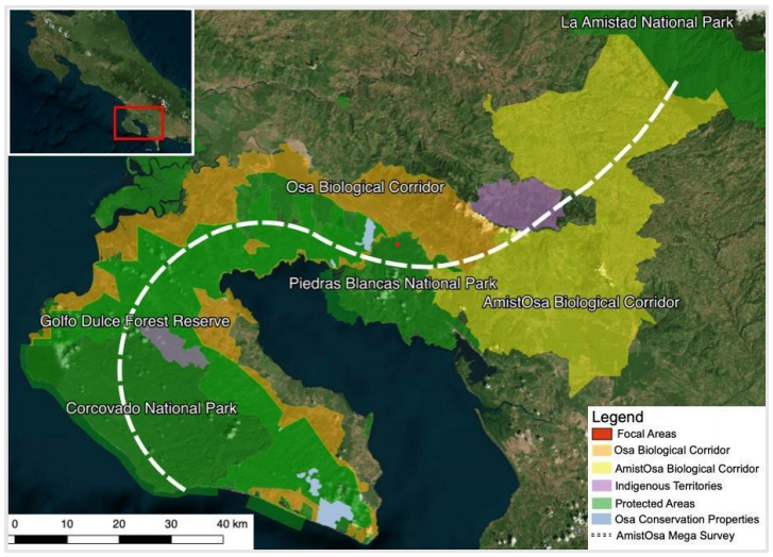Conservation success in Costa Rica’s Osa Peninsula

ICFC field partner Osa Conservation reaches new heights in Costa Rica
By Carlos R. Garcia, Senior Program Director, Sept. 2024
The latest report from ICFC's partner Osa Conservation (July 2024) highlights progress in rebuilding functional habitat connectivity through biological wildlife corridors from the lowland forest of the Osa Peninsula to the highland forests of La Amistad National Park in the Talamanca Mountains. The Osa Peninsula is a renowned hotspot of biodiversity and endemism and has the largest mesic rainforest remaining on the Pacific slope of Central America and the largest mangrove system in Costa Rica.
Two key areas of progress are summarized below.
Building improved landscape resilience and habitat connectivity
Over the past 30 months, OC has planted 304,576 native, rare or threatened trees across 320 hectares of land throughout the region. This includes 200,576 trees planted across 240 ha of farmland within the AmistOsa Biological Corridor (see map, above). This was done in collaboration with OC's Restoration Network that has 346 local community members—predominantly small and mid-sized farmers and landowners.
OC's planting efforts also include community-led mangrove restoration in the Terraba Sierpe National Wetland, where they have planted and restored 131 hectares, creating employment for 45 local community members.
Through its Farms for Nature initiative (launched in 2023), OC has introduced a novel microcredit fund system ($5,000-$15,000 depending on farm size) to support Restoration Network farmers and small landowners who farm in a way that will enhance biodiversity and improve the natural health of agricultural landscapes. Farmers work with OC staff to develop a landscape transformation plan based on a sustainable production and land sparing model where biodiversity can thrive. Participants are eligible for debt pardons in exchange for demonstrated farm biodiversity improvements (audited biodiversity credits), which can result in up to 50% debt elimination.
Linear disturbances such as roads and power lines act as a barrier to wildlife movement and cause mortality, especially for arboreal species such as the woolly opossum. OC continued to address this by deploying 27 arboreal bridges (with 8 different designs). These allow wildlife to safely traverse roads and power lines and avoid traffic collisions or electrocution (see Youtube video Wildlife Bridges Connect the Rainforest Canopy).
An Overpass Technical Report authored by OC personnel identified the locations in Southwestern Costa Rica where wildlife overpasses would yield the greatest benefit.
Empowering civil responsibility
OC's Rainforest Protectors, comprised of 41 volunteers from 11 local communities, recently added two new chapters of Ocean Protectors that help to safeguard the coastline north of Corcovado National Park. Overall, OC's volunteer rangers have patrolled 129,409 km, detecting 62 illegal activities and recording 51,396 observations in the iNaturalist app. To empower a network of citizen scientists, OC launched the Amistosa Biodiversity Survey (ABS), which has had a great response! After conducting 54 workshops on citizen science development across eight local communities, ABS wildlife observations increased to 159,416, and the number of observers has risen to 4,087 since the ABS launch in July 2022.
Looking Forward
Through its Ridge to Reef initiative, Osa Conservation aims to restore and re-connect the southern Pacific tropical lowlands of the Osa Peninsula to the high-elevation wilderness of the Talamanca Mountain region, and to promote this approach as an innovative model for cross-sectoral biological corridor conservation that can be replicated internationally. Their latest report confirms that their conservation work is having a positive impact in one of Central America’s most biodiversity-rich regions.
Support this groundbreaking project today with a donation. Learn more about Osa Conservation by visiting our project page.
International Conservation Fund of Canada Copyright © 2009-2025
Registered Canadian charity # 85247 8189 RR0001
